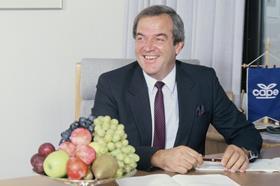
South African fruit industry executives have united in their praise for legendary fruit industry executive Louis Kriel, who passed away on Friday (10 August).
Kriel died at his home in Stellenbosch on Friday at the age of 78. A memorial service will be held in Stellenbosch on Wednesday (15 August).
Both veteran table grape grower Piet Karsten and former SATI chairperson Graham Retief described Kriel as a leader who was ahead of his time.
“His strategies were not always understood by the industry around him,” said Retief. “If we had supported him more the industry would today have been entirely different and we would perhaps not have seen the turmoil immediately after deregulation.”
Influential former commercial director at international supermarket group Tesco, Colin Smith, said Kriel was a 'giant of a man' and an incredibly proud South African. “He was as tough a business man as I’ve ever negotiated with, always putting South African farmers first. He was the most genuine, generous ambassador South Africa could have had,' he said.
On a lighter note, Smith said that Kriel was the worst loser when the national rugy team, the Springboks, suffered defeat at Twickenham against England.
Piet Karsten outlined that no-one else taught him more about fruit marketing than Louis Kriel. “He was the master of fruit marketing strategies and customer relationships. One must remember that he served the industry at a most difficult time when our fruit had to be sold internationally despite sanctions. What he did during this period was truly remarkable and bears testimony to the genius that he was.”
Retief noted that growers and other industry leaders simply did not grasp his thinking and incredible ability to always stay ahead of the game. “At the beginning of the 1980s he realised that our table grape industry should change and change quickly. His idea to develop the Orange River region as South Africa’s premier seedless table grape region was vigorously opposed by the table grape growers in Paarl and the Hex River Valley, which were essentially seeded grape regions. Today we know he was right and it was us that had to adapt much more quickly than we did.”
'In just 20 years he and his teams revolutionised established practices and turned stagnating businesses suffering political and geographical pressures and antiquated portfolios into internationally respected brands being sold globally,” said Richard Brighten, former executive at Capespan International in the UK.
“While unstintingly loyalty, approachable, with great business discipline, a great sense of humour and friendship and sometimes charm, he had a short fuse when it came to inefficiencies, time wasting and bureaucratic quagmires,” Brighten added. “He was an inspiration and challenge to work with but there was never a dull moment.”
Kriel’s strategy on seedless grapes and the Orange River was not the only one misunderstood by the South African fruit export sector. The pome fruit sector was on many occasions hostile to his initiatives, particularly during the 1990s when it was suggested that the logical step would be to develop Cape - at that stage the leading deciduous fruit brand in the UK and Europe - into an international brand. Kriel’s brand strategy was built on a basket of fruit offered over 12 months of the year and was introduced in 1982, enduring until 1999.
Colin Smith previously recorded the first time he met Louis Kriel. “I was sitting in my office waiting for a meeting with him when the door swung open and in walked Louis. His opening words were ‘Mr Smith, I hear you want to buy some grapes.’ After I shook his hand and confirmed that Tesco was indeed planning to expand its business relationships with Unifruco, Mr Kriel enquired how many grapes I would need. When I confirmed the volume, he said ‘that’s ok, the price will be set by us.”
His joint venture between fruit and wine growers saw the establishment of one of South Africa’s most successful wine exporting initiatives during the late 1980s and 1990s when Arniston Bay became one of the best known brands in British supermarkets.
When Kriel and other South African business leaders met the ANC in exile in the UK before the release of Nelson Mandela to help pave the way for a peaceful transfer in South Africa, these wines, as Kriel later recorded, often proved to be the ‘game breaker’ to overcome sticky points.
Equally determined to make sure that South Africa carried out a positive message to the international community, Kriel arranged the first cultural exchange under the new democratic government in the form of a number of successful performances by the Cape Town City Ballet in London.
During the sanction years, he was equally comfortable in the corridors of the Capitol Building in Washington as in the offices of Whitehall in London. Later he would personally honour the steadfastness of Margaret Thatcher by receiving her at Fleurbaix in Stellenbosch and naming a nectarine, Margaret’s Pride, after her.
He was not scared to stand up to politicians. PW Botha, in 1988, got very annoyed when Louis Kriel told him at a media conference in London it was time to release Nelson Mandela. When he got back to Cape Town the next day, he was called out of a board meeting by an irritated Botha: “Mr Kriel”, said Botha, (who was also called the ‘Big Crocodile’, because of his aggressive nature), “thank you for the great work you are doing in marketing the country’s fruit, just a pity about your stupid interview.” Louis stuck to his guns and an even more irritated Botha said: “Mr Kriel, you sell your fruit and I will run the country!” Then he hung up.
Other observers call Louis Kriel one of the outstanding leaders in the 125 year history of the South African fruit export industry and a man who left a lasting legacy for the present generations.



